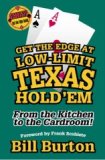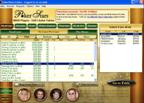
Get the Edge at Low Limit Texas Hold'em
Common Texas Hold'em Mistakes
Mistakes in Texas Hold'em are costly when you are the one making them. Mistakes are profitable when your opponents make them. You will make more money from your opponent’s mistake that you
While some mistakes unforeseeable due to insufficient information concerning your opponents hand other mistakes do fall into the bad play category. Here are just a few common mistakes made by Texas Hold’em players.
The biggest mistake a player makes is calling when they should fold. In Texas Hold’em when you decide to play a hand, you have to call the big blind bet.
Playing too many hands is most common in Texas Hold’em because there is always a chance that any two cards can win based on the community cards. However playing every hand will not be profitable in the long run. Playing too many hands is the downfall of many players and although it happens most in low limit games it does happen at all betting limits
Some stating hands have a positive expectation and others are negative expectation hands. The two biggest mistakes that many low limit players make is playing any two suited cards (I refer to this as ASAP) from any position and playing a single ace from any position. (I call this SAP)
ASAP is the number one mistake made by many players. Getting two suited cards as a starting hand is fairly common. The probability of being dealt two suited cards is 23.58% that means those who like to play ASAP will have plenty of chances to enter the pot. Completing your flush is a lot more difficult. If you start suited and stay to see all seven cards (your two and the five board cards), the probability that you will make a flush is 5.77%. The odds against you are 16.3:1
The second mistake is playing a single ace from any position. You will be dealt at least one Ace about 15 percent of the time before the flop which means that 85 percent of the time you won't have an Ace. Maybe that is the reason that players get so excited when they see an Ace.
If you are playing at a full table with ten players and hold a single ace the probability that there is no other player also holding an ace is 25.31 percent. That means that when you have an ace one of the nine other players will have an ace 75 percent of the time. This is why you need to consider your other card known as your kicker to go with that single ace.
Playing an Ace with a small kicker is referred to as playing a "weak Ace." When you do this, you are setting yourself up to be beaten by a player who holds an Ace with a higher kicker.
Many players over value their small pairs. Small pairs are lousy hands if they do not improve on the flop. If there are overcards and more than one player, you should throw your hand away if there is a bet in front of you. There are only two cards in the deck that will help you. The odds are 11:1 against making a set on the Turn and 22:1 on the river. These are not good odds. The best strategy is to fold if you make a set (3 of a kind) on the flop.
After the flop, you have nothing. Everyone has checked to you. Many players will bet in this situation in hopes of stealing the pot. Don’t waste your money. The reality is that in a low limit game with a multiway pot you will find someone chasing. Save your money and take a free card.
If you think you have the best hand after seeing the Turn card and are first to act, then go ahead and bet. Many players will try to get fancy and attempt to check raise in this position. If the other players also check, you have lost a bet or two. In low limit games, the straight forward approach is usually the best as there are plenty of players who will call you. Make them pay. Why give them a free card if you don’t have to.
If you get to the Turn and you hold only two unsuited overcards (two cards higher that any cards on the board) with no flush or straight draw, then you should fold if there is a bet in front of you. Too much money is lost by players who hope to catch a miracle card on the river. The best hand you can make with two unsuited overcards is a pair that will probably lose anyways.
If another player raises on the turn and you hold only one pair you are more than likely beaten and should fold. Unless you determine they are on a draw. This is where learning to read the board is important. But players don’t usually raise on the turn without a hand.
Don’t try to Check Raise or get fancy on the River. If you have the best hand and are fist to act you should bet. You don’t want to check and give the other players a chance to see your hand for free if they decided to check as well. You will make more money by betting your good hand.
When you get to the river, there are two mistakes that you can make. One is to call a losing bet, which will cost you the price of a bet. The other is to fold your hand, which will cost you all the money in the pot. Obviously folding your hand will be a far more costly mistake then merely calling a bet. If there is a slight chance, you may have the winning hand you should call. I’m not advocating calling with nothing but you should call if there is a chance to win.
If you hold only top Pair and there is a raise with a flush or draw on the board you are beat. Seldom will a player bluff with a raise on the river with 3 suited cards on the board.

